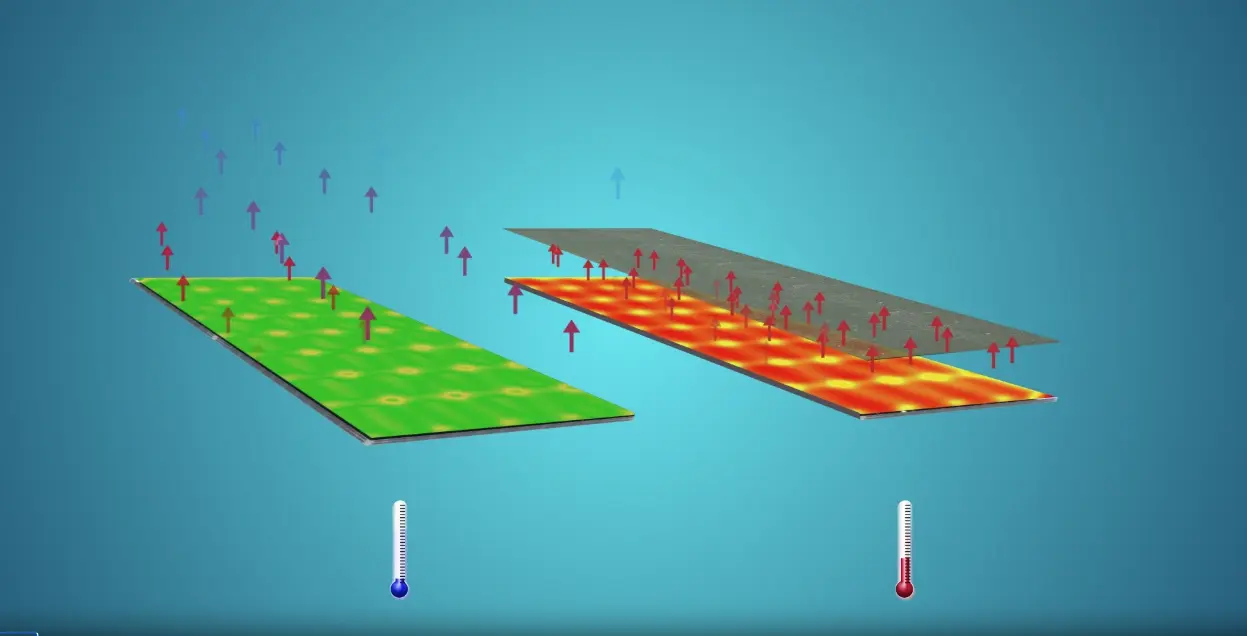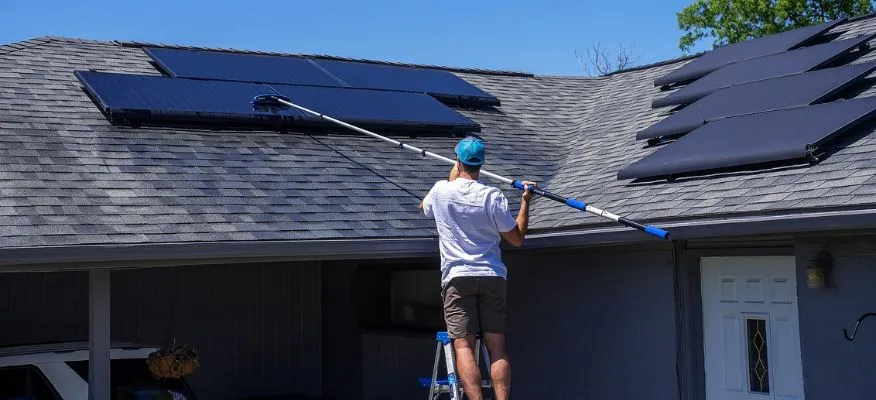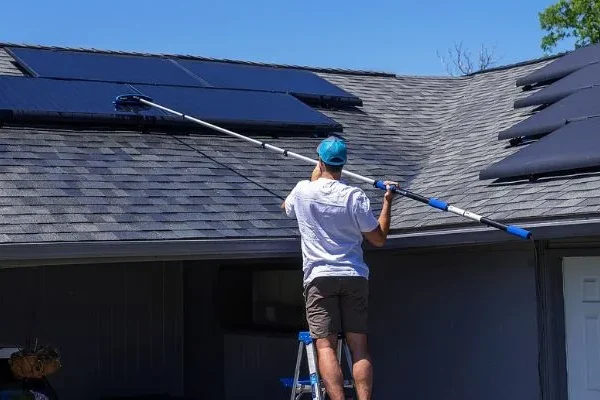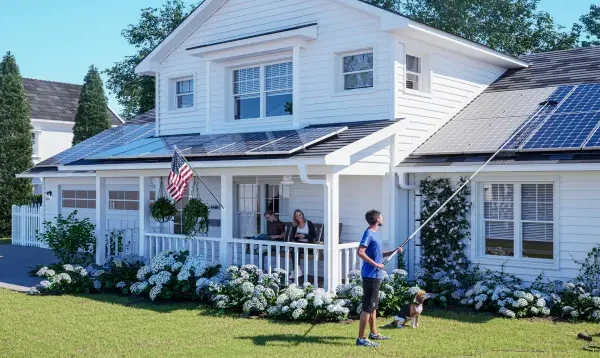How to clean your own solar panels: A DIYer’s Guide
You went solar? Congratulations!! Are you relieved at the savings on your bills, and happy you didn’t wait??
Like your skeptical best friend, we are here to nudge you and ask, hey, what’s the maintenance like on those things? Is rain enough? How do you clean your own solar panels, anyway?
In this article we’ll tackle these questions and more so you know, once and for all, how to clean your own solar panels!
The cleaning conversation
We know that for many companies that install rooftop solar panels, keeping them well-maintained is a subject that many installers don’t concern themselves with. Some solar installation companies do instruct their customers on maintenance but in our conversations with installers and rooftop solar owners, this conversation is brief.
‘‘We don’t deal with cleaning or anything like that. We install and move on.
— Actual words spoken by an installer at InterSolar 2024
What happens to solar panels when they get dirty?
There is no shortage of natural factors that will cause accumulation on solar panels:
- Dust
- Pollen
- Bird droppings
- Tree sap
- Soot
- Sand (especially in areas close to agricultural areas).
All of these particles sink in the air around us and come to rest on your solar panels. And that’s not all: moisture accumulates at night, eventually condensing into droplets, and the more flat, even and smooth the surface is – the more the moisture just sits there.
This accumulated moisture combines with all those particles we mentioned before and creates a heavy mud, just like dough or cement, which wind or rain cannot remove. Night after night, the moisture in the air makes the paste stickier, attracting more dust, pollen and sand, encouraging the layer to settle in a thick layer on the surface of the panel.
In short, this dirt is here to stay, unless you take care to clean it!
Tip
Isn’t rain enough to clean my solar panels?
One of the myths (that should be debunked!) is that the rain will do its work, and the panels will be cleaned from season to season.
We know this isn’t actually true, and this 2023 study on Clean Technica has also debunked the myth that rain will keep panels clean. So, why doesn’t rain clean solar panels?
First of all, in the sunniest parts of the US such as in the states of Arizona, New Mexico, Nevada, California, or Texas, the rain is insufficient to clean the panels thoroughly or frequently enough. In addition, rain can only reduce fine dust – but not coarse dust, sand, pollen, triple ions and dirt that crystallizes during dry periods on the panels. Also, the relatively flat angle at which the panels are installed in most home systems only adds to the accumulation of dirt.
So, while rain can remove loose dirt, it’s not a substitute for a proper cleaning method to get rid of persistent pollutants like pollen.
How do you clean your own solar panels?
Facts are facts: 13 billion paper towels are used annually in just the United States, adding to an already unmanageable amount of waste in landfills, oceans, rivers and lakes.
As a conscientious consumer invested in solar energy, you don’t make a decision just for your personal well-being; it’s a commitment to the health of our environment and the sustainability of our communities.
Instead of adding to the problem of excess waste, when you clean your solar panels, use a method that is 100% reusable with zero waste per use.
Clean panels last longer, and can generate up to 30% more green energy to power your home and your lifestyle. In order to maintain proper solar panel function over time, it is important to clean your system in a way that will A) not damage the system and B) maintain its efficiency:
- Use SolarWater – to prevent limescale build-up
- Clean with water only, not detergents
- Use specialized brushes with soft fibers that do not scratch the ARC on the panels.There are all kinds of brushes on the market, but you should make sure the brush is specifically designed for solar.
- Use the SolaReef Solar Panel Cleaning System – The super-soft bristles and 200 water jets in the SolaReef200™ brush wash away panel dust and debris using our patent-pending SolarWater™ treatment capsules, protecting your panels from scratches and limescale.
Did you know?
We developed our SolarWater treatment capsules to be long-lasting yet compact in order to minimize waste while providing value. Plus you can recycle your used capsules! We are proud to support sustainability and protect the environment from unnecessary waste and will take your used capsules back when you are ready to purchase new ones. Click here for more information on the capsule exchange program.
The problem with tap water, a squeegee, and soap
There is no doubt that as fellow DIYers, we always look for the quick solution. Why not just go up to the roof with a rag and a hose? But in reality, washing without proper knowledge and equipment can cause heavy damage to the system. (Remember that warranty?) These damages may not be visible at first, but over time affect the efficiency and the panels dramatically.
This is where using the right tools and techniques come in. View our comparison chart of some common methods used to clean panels.
What’s wrong with tap water? Tap water contains a high concentration of minerals, around 500 parts per million (ppm) on average. Washing in tap water can cause limescale to accumulate on the panels and destroy their coating layer. For this reason, panel manufacturers recommend washing solar panels with treated water that contains a lower concentration of minerals.
Did you know?
Over 85% of homes in the United States have hard water.
No squeegees! After washing with water, many people treat their panels like other glass such as window panes, and wipe the panels with a rag or squeegee. Coarse towels, scrub brushes, and squeegee mops can easily create scratches and permanent damage to the panels’ anti-reflective coating (also known as ARC). If the ARC is damaged, your panels will not absorb as much sunlight, and your energy production will diminish.
No soap! Dish soap and other household cleaning agents are strictly prohibited and are not approved by panel manufacturers. In addition, they may leave sticky deposits that attract dirt and dust and worsen the condition of the system.
When it comes to cleaning tools, details matter. Read this article that compares cleaning methods and their cost.
Protecting your solar panel warranty is crucial to ensuring the long-term performance and reliability of your investment.
The most important factor in keeping your warranty intact is regular maintenance, and safe, routine cleaning is number one on the list of maintenance checks. However, accidental damage like scratches or degradation of the anti-reflective coating caused by using unapproved cleaning methods will most likely void your warranty, leaving you financially exposed if a repair is needed.
The dangers of dirty solar panels

How does dirt damage a solar panel?
A little dirt can become a lot of dirt fairly quickly, and the efficiency of solar panels depends on how much they are exposed to the sun: dirt literally gets in the way of efficient energy production.
But this is not the only problem.
There is a much more serious problem: long-standing or permanent dirt creates hot spots on the panels – and these cause the system to overheat. How does that happen?
As soon as dirt accumulates on one part of the solar panel, sunlight does not reach the photovoltaic cell below it – compromising its function. Consequently, the load on the other PV cells connected to it increases – and the entire system heats up as a result. The reduced capacity of the blocked cell causes it to resist the passage of current through it, which causes accelerated wear and tear of not only the cell but also the materials around it.
Eventually, it will stop working.
The efficiency of a system that is not regularly maintained can drop by about 30%, and produce electricity inconsistently and inefficiently.
Not only does the efficiency of the system decrease as soon as it heats up, consistent overheating over time can cause the entire system to stop working, as well as causing other damages that are not covered by the manufacturer’s warranty.
Why Choose
SolaReef?
- Easy DIY Cleaning: Designed with DIY enthusiasts and solar panel owners in mind, the SolaReef system is user-friendly and provides thorough cleaning without the hassle.
- Gentle on Panels: Our system is specifically designed to be gentle on solar panels, ensuring no damage during the cleaning process, so you can enjoy peace of mind.
- Enhanced Efficiency: By keeping your solar panels clean, SolaReef extends their lifespan and maximizes their efficiency, ultimately saving you money in the long run.
We are here to
help!
Keep your solar panels sparkling as they soak up the sun with our easy-to-use, all-in-one cleaning system designed for residential use.





